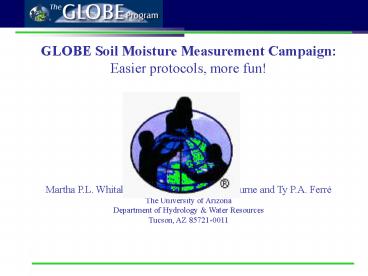EOS - PowerPoint PPT Presentation
1 / 16
Title:
EOS
Description:
The GLOBE Soil Moisture Project. GLOBE Soil Moisture Measurement Campaign: ... The GLOBE Soil Moisture Project. How to make a foil pouch in 5 easy steps. fold in half ... – PowerPoint PPT presentation
Number of Views:55
Avg rating:3.0/5.0
Title: EOS
1
GLOBE Soil Moisture Measurement Campaign Easier
protocols, more fun! Martha P.L.
Whitaker, Bart Nijssen, Jim Washburne and Ty P.A.
Ferré The University of Arizona Department of
Hydrology Water Resources Tucson, AZ 85721-0011
2
Presentation Overview
- 1. Why is soil moisture so exciting?
- 2. What is the Soil Moisture Campaign (SMC)?
- 3. How can I get started?
3
Soil Moisture and Teacher Curricula Great Ideas
- Why should we care about soil moisture?
- Soil moisture affects entire ecosystems
- soil water provides nutrients to plants
- soils can rinse water as water flows through it
- water helps form soils
- water promotes decay of plants that become part
of the soil - Soil moisture plays a major role in watersheds
- soil acts like an enormous sponge across the land
surface it slows rainwater runoff and helps
control flooding! - Soil moisture affects the entire water cycle
- water from soil evaporates back to the
atmosphere this cools the soil and increases the
relative humidity of the air. - changes in relative humidity can affect the
weather
4
What factors affect Soil Moisture variability?
- Precipitation
- Soils
- Exposure
- Land cover
- Weather
- Climate
5
Soil Moisture and Real Scientists
- Real scientists will use student-collected data
to - Compare with satellite-collected soil moisture
data - Ground-truth data is very important to
interpreting satellite imagery - Compare with computer models of soil moisture
distribution across local and regional areas - Computer models of global climate change rely on
accurate soil moisture data - Students are inspired by real-world use of
their data
Meet a scientist who runs global climate models
Meet a scientist who studies soil moisture in
ecosystems
Bart Nijssen
Martha Whitaker
6
The Soil Moisture Campaign (SMC)
- SMC is now the preferred protocol
- (Although data will still be accepted from all
soil protocols) - Collect near-surface samples (0-5 cm and 8-12
cm) - Collect duplicate samples
- Record a GPS location or find
- lat/lon from USGS topo map
7
The SMC is consistent with previous protocols
- SMC is identical to the near-surface
gravimetric protocol EXCEPT - Frequency
- October 11-19, 2003 (World Space Earth Science
week) - April 17-25, 2004 (Earth Day week)
- Location (roving/regional vs. fixed/school site)
- Ideally, collect as many samples as
- feasible within an hours drive
- of a school
Example of a driving loop in the Tucson, Arizona
vicinity
8
Soil Moisture and Teacher Curricula good timing
- SMC data collection dates coincide with
- Earth Day (4th week in April) and
- World Space /Earth Science week ( mid-October)
- Teachers may already plan to discuss
environmental science, and soil moisture is an
ideal topic! - Collection of samples is hands-on sciencefor
your students.
- Soil sample collection protocol builds on
several skills (e.g. GPS use, map reading,
observations, scientific record-keeping, Internet
skills for data reporting, etc.)
9
Challenges associated with the SMC
- Getting a Latitude /Longitude for each sample
location - BUT.GPS can be done before, during or after
sample collection OR interpolate your location
from a USGS topographic map - Drying large numbers of samples, especially if
you dont have an oven - BUTWe can help locate local scientists with lab
ovens to help you dry the samples - ANDWe provide you with instructions to build
your own low-tech, low cost oven
10
Opportunities associated with the SMC
- Focused effort, once per semester easier to
schedule - Great way to develop regional collaborations
- with other schools
- with soil moisture professionals/agencies
- Our active research provides timely motivation
- Low-cost options available
- Students will have fun!
11
Basic Equipment you will need
12
Low-cost option 1 Foil pouches
- Dont have soil cans?
- Use foil pouches!
- Did we mention low cost?
- Materials easily available virtually everywhere!
- Easy, fun task for most ages of students to make.
- No soil cans to clean!
- Foil packets should not be reused, but the
aluminum is recyclable.
13
How to make a foil pouch in 5 easy steps
(a)
(c)
(b)
(e)
(d)
14
Low-cost option 2 Light-bulb powered oven
- Dont have a lab oven?
- Make your own low-tech oven!
- Did we mention low cost?
- TOTAL COST OF LIGHT BULB OVEN 100 or as
little as 75 - if two groups split the cost of a 55-gal drum
(only ½ drum is needed) - This is a 66 savings over a traditional,
low-end lab oven model - Most materials available at hardware stores!
- Interesting, fun project for a handyman/woman to
supervise
15
Schematic of Light-Bulb Powered Oven
16
Contact information
If you have any questions about the GLOBE Soil
Moisture Campaign, please contact Martha P.L.
Whitaker GLOBE Soil Moisture Research
Scientist mplw_at_hwr.arizona.edu (520)
621-9715 http//www.hwr.arizona.edu/globe/sci/SM/
SMC/































